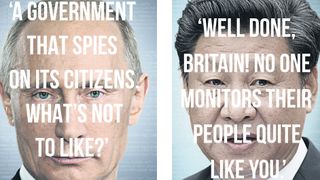Proposed Internet surveillance will give dictators ideas, claims campaign
Putin et al will appear on billboards and newspapers

A new campaign has been launched calling on the government to make changes to the Investigatory Powers Bill - the proposed law that would, for the first time, explicitly legalise the bulk internet surveillance powers of the type exposed by Edward Snowden.
A new poster at one of the busiest motorway junctions in Britain, and adverts in the Guardian and the Telegraph as well as online today mark the launch of the campaign, which argues that Home Secretary Theresa May should "stop giving dictators ideas".
The group behind it, named Don't Spy On Us, is a coalition of a number of civil liberties groups - including Liberty, the Open Rights Group, Privacy International and Big Brother Watch.
The basic argument they are making is that, though the proposed measures might seem benign or even a good idea in Britain, the same technologies and similar laws could be used for more sinister purposes by non-democratic governments.
And this, their argument goes, causes a problem on two levels: First off, the likes of Russia, China or other nasty regimes like Zimbabwe would be less hesitant about using similar systems to spy on political opponents rather than just terrorists. And secondly, if they did that, it would be harder for us to condemn them - as for all intents and purposes Britain would have very similar laws and technical systems in place.
The campaign's director Eric King described how this is already starting to happen.
"When China introduced controversial sweeping surveillance powers just a few months ago its government claimed it was doing 'basically the same as what other major countries in the world do.' Oppressive regimes are already following our lead."
Get daily insight, inspiration and deals in your inbox
Get the hottest deals available in your inbox plus news, reviews, opinion, analysis and more from the TechRadar team.
'Providing examples for dictators across the world'
"The UK government should be leading the way in guaranteeing safe and secure communications for everyone," he added. "Instead it is providing examples for dictators and across the world.
Each advert in the campaign shows how the group imagines a dictator would react favourably if the IP Bill, which has been nicknamed the "Snooper's Charter", becomes law. One shows Russian President Putin saying "A government that spies on its citizens. What's not to like?", while another shows Chinese President Xi Jinping saying "Well done, Britain! No one monitors their people quite like you."
Under the proposals as they currently exist, the campaigners say that the bill will give police the power to read your browser history, even if you are entirely innocent, and will let the intelligence agencies hack your devices to, say, listen to you through your microphone or watch you through your camera.
At the time of writing, the Bill is currently trundling through Parliament on its way to becoming law. It is currently in the committee stage, where MPs have another chance to scrutinise it, having passed its first reading earlier this year. So it could still yet be thwarted. At the time the Conservatives supported it, but it was opposed only by the Liberal Democrats (remember them?). The Labour Party and the SNP abstained.
The tech industry has had a mixed reaction to the proposals, with concerns that new rules could force developers to build backdoors into their software so that the authorities can access data - thus weakening security as a whole. Last December, Apple spoke out forcefully against the bill, saying, "The creation of backdoors and intercept capabilities would weaken the protections built into Apple products and endanger all our customers. A key left under the doormat would not just be there for the good guys. The bad guys would find it too."
It also dryly clarified the problems the new bill could create for encryption - a fundamental part of the digital world. The "best minds in the world cannot rewrite the laws of mathematics", Apple dryly added.
The campaign launches today, and this is a debate we can expect to rumble on when the bill hit second reading later this year.
